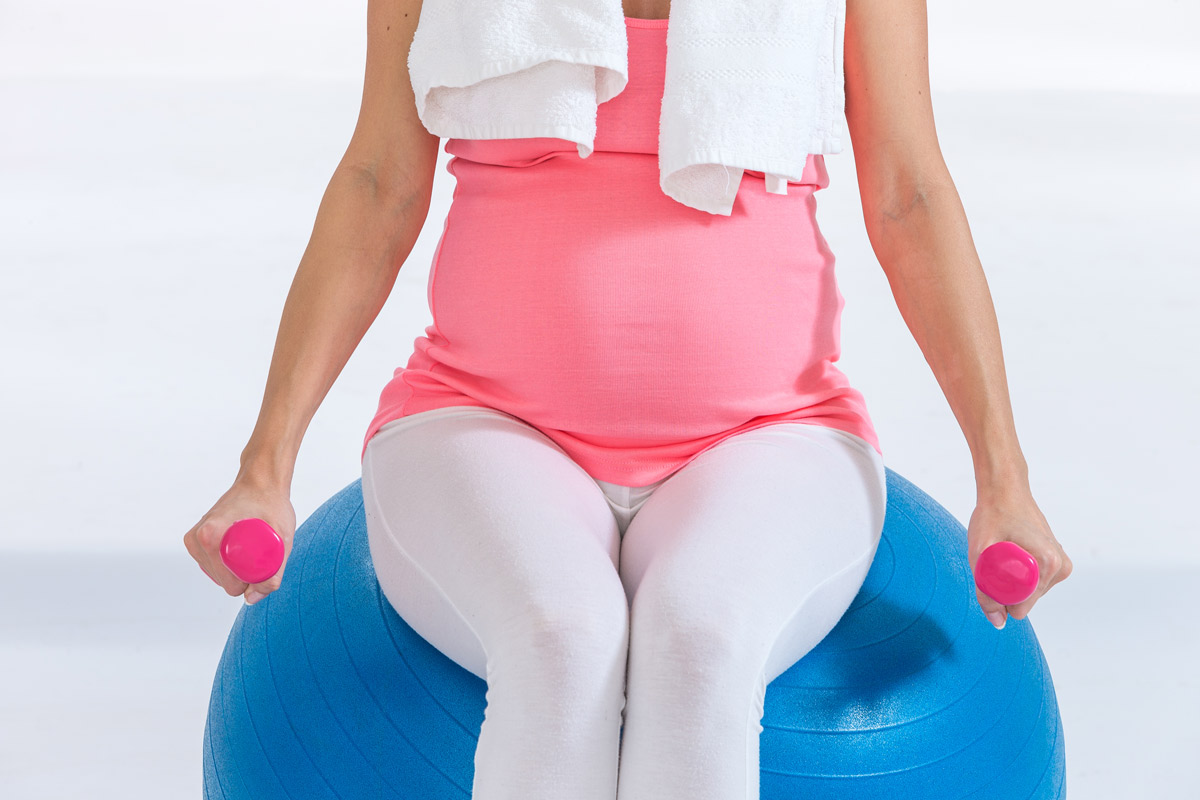
The Do’s & Don’ts of Exercise during Pregnancy
The female body goes through many changes during pregnancy, which may leave some women wondering – can I continue or start an exercise program while pregnant?
Moderate-intensity exercise is safe for normal, uncomplicated pregnancies and even has maternal benefits.
Exercise during pregnancy can improve or maintain current fitness levels, including cardiorespiratory endurance, muscular strength and endurance, flexibility and body composition.
Staying active during pregnancy also has been shown to improve women’s self-esteem.

Studies have shown that there is a connection between lack of physical activity, deficient diet and intrauterine growth restriction.
Other studies have shown that women who engage in moderate- to high-intensity exercises give birth to healthy babies who weigh less due to decreased body fat in the newborn. These women also can have an earlier delivery.
Therefore, it can be concluded that physical activity can help with having better intrauterine growth.
Women might deliver up to 5-7 days earlier than their due date if they are doing weight-bearing exercises, but in well-conditioned women, there is no risk of preterm labor.
In fact, women who exercise during pregnancy are less likely to go past their due date and may even have shorter labor and less fetal distress.
Exercise during pregnancy can also decrease the following risks:
- Gestational diabetes.
- Pregnancy-induced hypertension (high blood pressure) and preeclampsia.
- Nausea and vomiting.
- Constipation.
- Musculoskeletal pain and pelvic girdle pain.
- Urinary incontinence.
- Depression and anxiety.
- Maternal weight gain.
- Macrosomia (large for gestational-age baby).
- Instrumental delivery (use of vacuum or forceps) and C-section.
- Postpartum recovery time.
A regular exercise routine during pregnancy also makes it easier to lose weight once baby is born.
I recently gave birth to my second child and was able to keep up my exercise routine with jogging and lifting weights throughout most of the pregnancy.
As my pregnancy progressed, I cut back on the intensity of my workouts but was able to exercise up until the day I delivered.
I believe that being able to continue exercise during my pregnancy provided multiple benefits during the pregnancy, labor and post-partum period.

General Exercise Do’s & Don’ts during a Normal Pregnancy
DO: Work Up a Sweat!
Pregnant women can safely perform 30 minutes or more of moderate exercise on most days, if not on all days, of the week.
Light- to moderate-intensity exercise can include brisk walking, aerobic dancing, gardening, stationary biking and swimming.
Moderate exercise is considered any activity that elevates your heart rate and causes you to sweat. Another good test is that you are able to talk normally but not able to sing.
Women who were previously physically active can continue their regular regimen if their pregnancies are uncomplicated.
Strength exercises, such as resistance bands, dumbbells, yoga, Pilates and body-weight exercises, can be done 3-5 days a week.
If you don’t do them already, Kegel exercises are a simple way to help strengthen your pelvic floor muscles.
DON’T: Get Too Extreme
When exercising, consider your environment. Avoid extreme cold or hot environments, including hot yoga, as well as activities that have a high risk of falling (i.e., trail running, horseback riding, downhill skiing, etc.).
Also avoid activities that can put you at risk for abdominal trauma, such as contact sports like hockey, soccer and basketball.
Changes in altitude can affect your growing baby, so hold off on exercises that require exertion at high altitudes greater than 6,000 feet.
Scuba diving can pose the risk for decompression sickness for the fetus.
Women should avoid exercises that may decrease blood flow to the heart and cause low blood pressure.
After the first trimester, avoid exercises that require laying on your back for prolonged periods of time or require motionless prolonged standing.
Weight training is a good form of exercise, but avoid holding your breath for prolonged periods of time, and avoid marked straining with lifting.
Women can try to resume their pre-pregnancy exercise regimens after delivery, but most women go through deconditioning and may require 4-6 weeks or more postpartum to return back to normal activities.

Should Exercise Ever Be Avoided?
Women who have any of the following medical conditions should hold off on exercise during pregnancy:
- Heart disease or unevaluated cardiac arrhythmia (irregular heart beat).
- Restrictive lung disease.
- Incompetent cervix/cerclage.
- Multiple gestation at risk for premature labor.
- Persistent bleeding during the second or third trimester.
- Placenta previa after 26 weeks gestation (low-lying placenta that can be partially or completely covering the cervix).
- Premature labor during current pregnancy.
- Premature rupture of membranes (water bag broke).
- Poorly controlled hypertension, pregnancy-induced hypertension and preeclampsia.
- Severe anemia.
- Chronic bronchitis.
- Poorly controlled type I diabetes.
- Extreme morbid obesity (BMI greater than 40).
- Extreme underweight (BMI less than 12).
- History of extremely sedentary lifestyle.
- Current fetus has intrauterine growth restriction.
- Orthopedic restrictions.
- Poorly controlled seizure disorder.
- Poorly controlled thyroid disease.
- Heavy smoker.

Women should stop exercising and seek medical care if they experience the following signs and symptoms:
- Vaginal bleeding.
- Shortness of breath before exertion.
- Dizziness.
- Headaches.
- Chest pain.
- Muscle weakness.
- Calf pain or swelling.
- Preterm labor.
- Decreased fetal movement.
- Amniotic fluid leakage (which can indicate the water bag has broken).
If you have any concerns about the safety of starting or continuing an exercise program during pregnancy, consult with your primary care physician or obstetrician first.
You should also consult with your physicians before starting exercise if your pregnancy is considered high-risk or complicated.
Published on: August 23, 2019





